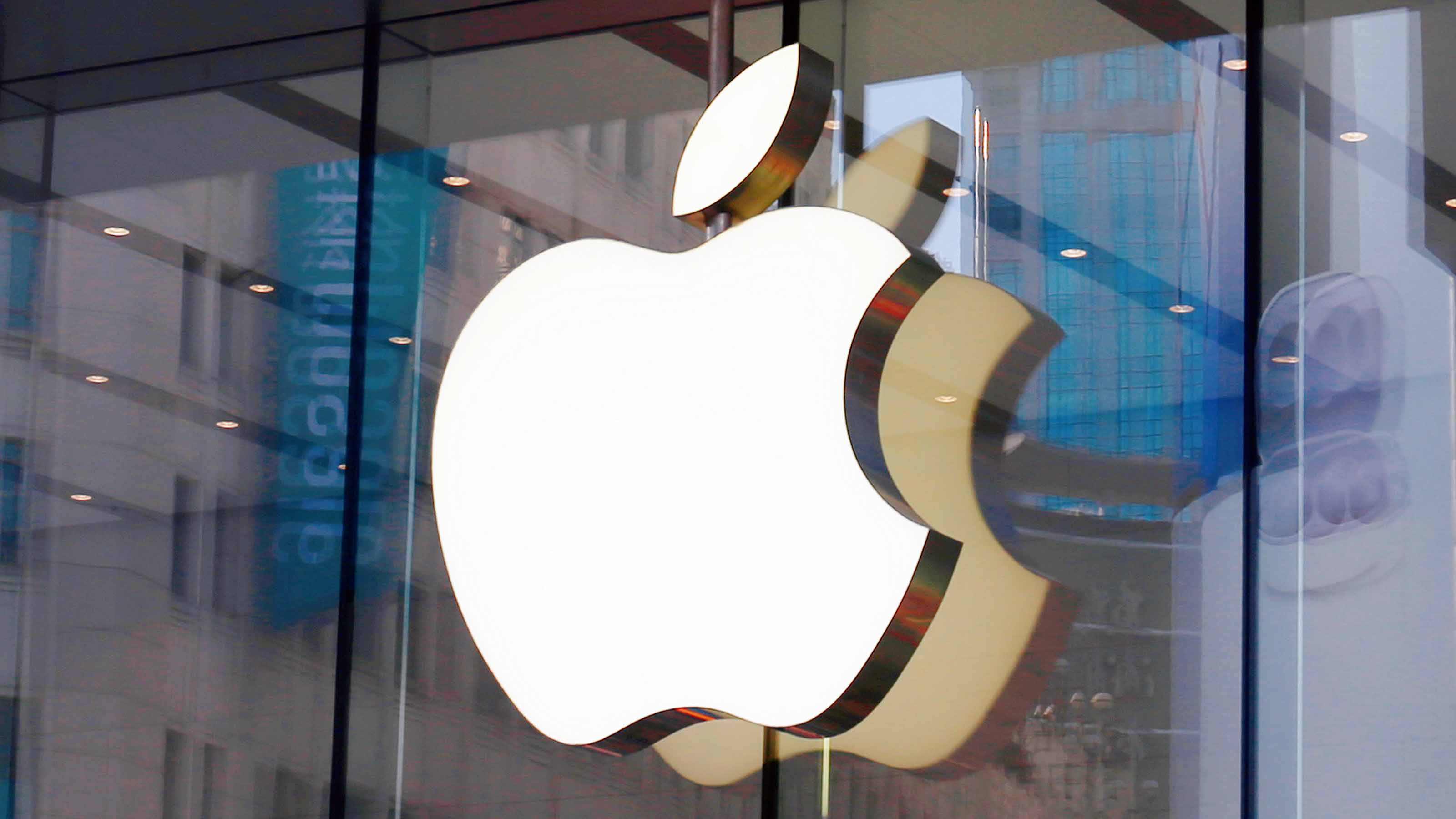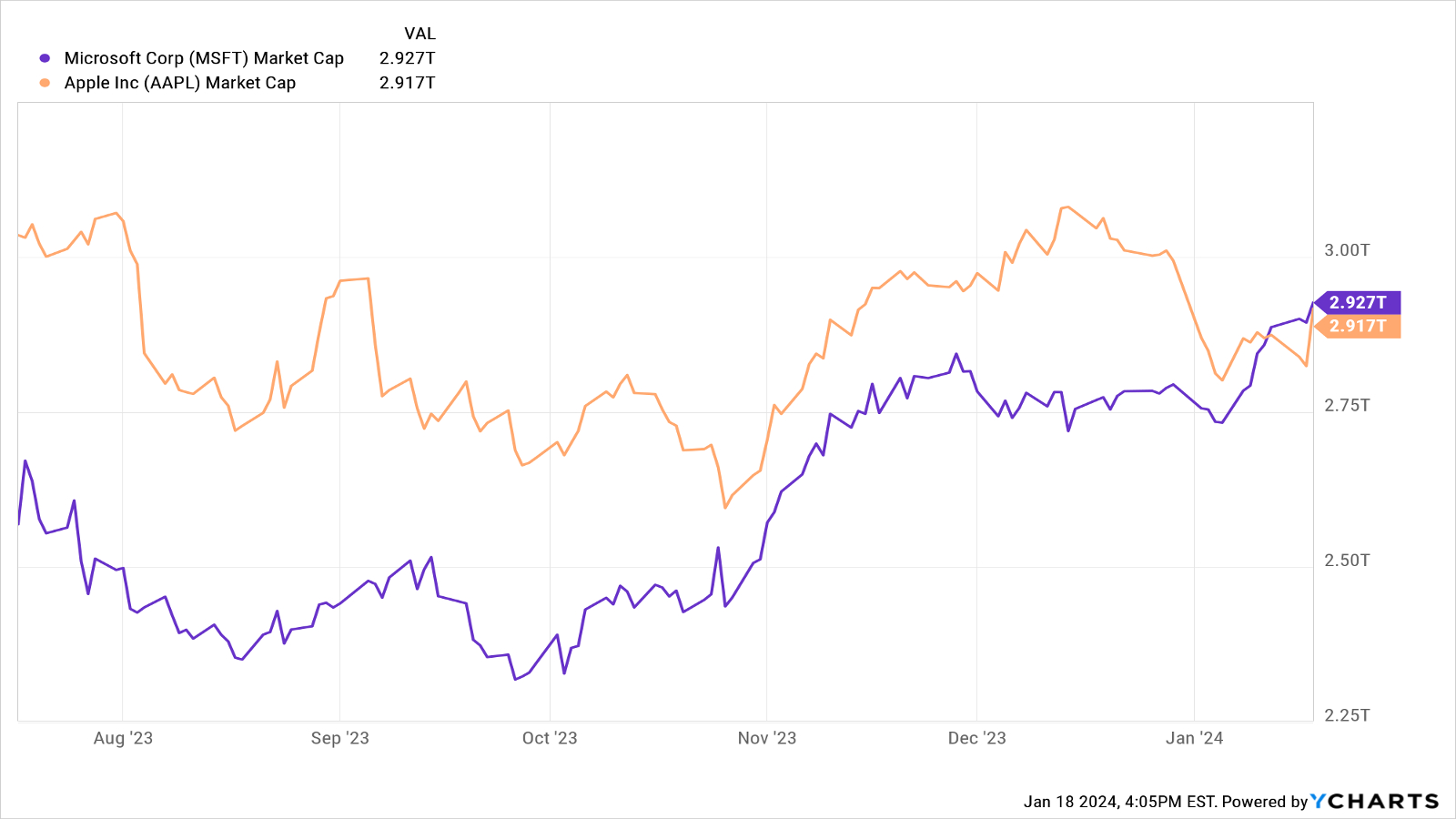World's Most Valuable Company: Apple and Microsoft Battle for Top Spot
Apple and Microsoft are running a tight race as they close in on $3 trillion in market capitalization.


Profit and prosper with the best of Kiplinger's advice on investing, taxes, retirement, personal finance and much more. Delivered daily. Enter your email in the box and click Sign Me Up.
You are now subscribed
Your newsletter sign-up was successful
Want to add more newsletters?

Delivered daily
Kiplinger Today
Profit and prosper with the best of Kiplinger's advice on investing, taxes, retirement, personal finance and much more delivered daily. Smart money moves start here.

Sent five days a week
Kiplinger A Step Ahead
Get practical help to make better financial decisions in your everyday life, from spending to savings on top deals.

Delivered daily
Kiplinger Closing Bell
Get today's biggest financial and investing headlines delivered to your inbox every day the U.S. stock market is open.

Sent twice a week
Kiplinger Adviser Intel
Financial pros across the country share best practices and fresh tactics to preserve and grow your wealth.

Delivered weekly
Kiplinger Tax Tips
Trim your federal and state tax bills with practical tax-planning and tax-cutting strategies.

Sent twice a week
Kiplinger Retirement Tips
Your twice-a-week guide to planning and enjoying a financially secure and richly rewarding retirement

Sent bimonthly.
Kiplinger Adviser Angle
Insights for advisers, wealth managers and other financial professionals.

Sent twice a week
Kiplinger Investing Weekly
Your twice-a-week roundup of promising stocks, funds, companies and industries you should consider, ones you should avoid, and why.

Sent weekly for six weeks
Kiplinger Invest for Retirement
Your step-by-step six-part series on how to invest for retirement, from devising a successful strategy to exactly which investments to choose.
Apple (AAPL) and Microsoft (MSFT) find themselves in a tight race over bragging rights to the title of world's most valuable publicly traded company after AAPL stock popped following a big analyst upgrade.
A poor start to the year already had some bulls saying it's time to buy the dip in Apple stock. But when one of Wall Street's largest broker-dealers joined the chorus before Thursday's opening bell, it helped Apple recover billions in market value.
BofA Securities lifted its recommendation on AAPL stock to Buy from Neutral (the equivalent of Hold), citing the iPhone maker's investments in generative artificial intelligence (AI) and the launch of its Vision Pro mixed reality headset, among other impending catalysts.
From just $107.88 $24.99 for Kiplinger Personal Finance
Become a smarter, better informed investor. Subscribe from just $107.88 $24.99, plus get up to 4 Special Issues

Sign up for Kiplinger’s Free Newsletters
Profit and prosper with the best of expert advice on investing, taxes, retirement, personal finance and more - straight to your e-mail.
Profit and prosper with the best of expert advice - straight to your e-mail.
With a new price target of $225 – up from $208 – BofA Securities gives AAPL stock implied upside of about 20% over the next 12 months or so. The Street's average target price stands at $199.40, according to data from S&P Global Market Intelligence, good for implied upside of only 6% in the next year.
Importantly, while some analysts have cited weaker iPhone sales in China as reasons to become more cautious on AAPL stock, the BofA Securities team led by analyst Wamsi Mohan argued as part of its upgrade that Apple's "China weakness is largely offset by strength in other countries."
Although Apple routinely makes the list of Wall Street's top-ranked Dow Jones stocks, worries over demand in China have AAPL off to a rough start in 2024. Apple stock is up about 38% over the past 52 weeks, but shares have spent all of January in the red on a year-to-date basis, hurt partly by downgrades.
Piper Sandler analyst Harsh Kumar cut his recommendation on the stock in early January to Neutral (the equivalent of Hold) from Overweight (Buy), citing a weak macroeconomic backdrop in China. Kumar's downgrade followed a more bearish downgrade by Barclays analyst Tim Long – to Underweight from Neutral – two days earlier. Long also cited weaker revenue in China as a concern.
Apple has seen iPhone sales soften in China amid an economic slowdown and other factors. Consumers are holding onto their pricey iPhones longer between refresh cycles, analysts note, while a new 5G phone from rival Huawei is also chipping away at iPhone demand.
Microsoft and Apple run neck and neck
While Apple stock has traded essentially sideways for six months on worries that growth has peaked, fellow Magnificent 7 stock Microsoft overtook it as the global leader in market capitalization thanks to exuberance over generative AI.
Microsoft, which enjoys a sort of first-mover advantage in AI via its partnership with OpenAI, had already been an outstanding long-term holding thanks to its dominance in cloud services.
Not only was MSFT one of the 30 best stocks in the world for three decades, anyone who put $1,000 into Microsoft stock 20 years ago would have clobbered the broader market.
Check out the stocks billionaires are buying or hedge funds' top blue chip stocks and you'll see that much of the putative smart money agrees with the Street's view, which gives MSFT a rare consensus recommendation of Strong Buy.
"Microsoft continues to pursue long-term growth through its AI and cloud investments, and may just hold the premier position in business technology," writes Argus Research analyst Joseph Bonner, who rates shares at Buy. "It also has a large and loyal customer base, a large cash cushion and a rock-solid balance sheet."

Have a look at the above chart and you'll see how bullishness like Bonner's helped Microsoft stock return nearly 65% over the past 52 weeks, allowing it to surpass Apple in market capitalization.
As of Thursday's close, the two tech giants were separated by less than $10 billion in market cap: $2.927 trillion for MSFT vs $2.917 trillion for AAPL, or essentially tied.
Whether the companies' market values diverge from here is the big question. Happily for investors in both names, the Street very much expects AAPL stock and MSFT stock to continue to beat the broader market in the year ahead.
Related Content
Profit and prosper with the best of Kiplinger's advice on investing, taxes, retirement, personal finance and much more. Delivered daily. Enter your email in the box and click Sign Me Up.

Dan Burrows is Kiplinger's senior investing writer, having joined the publication full time in 2016.
A long-time financial journalist, Dan is a veteran of MarketWatch, CBS MoneyWatch, SmartMoney, InvestorPlace, DailyFinance and other tier 1 national publications. He has written for The Wall Street Journal, Bloomberg and Consumer Reports and his stories have appeared in the New York Daily News, the San Jose Mercury News and Investor's Business Daily, among many other outlets. As a senior writer at AOL's DailyFinance, Dan reported market news from the floor of the New York Stock Exchange.
Once upon a time – before his days as a financial reporter and assistant financial editor at legendary fashion trade paper Women's Wear Daily – Dan worked for Spy magazine, scribbled away at Time Inc. and contributed to Maxim magazine back when lad mags were a thing. He's also written for Esquire magazine's Dubious Achievements Awards.
In his current role at Kiplinger, Dan writes about markets and macroeconomics.
Dan holds a bachelor's degree from Oberlin College and a master's degree from Columbia University.
Disclosure: Dan does not trade individual stocks or securities. He is eternally long the U.S equity market, primarily through tax-advantaged accounts.
-
 Dow Leads in Mixed Session on Amgen Earnings: Stock Market Today
Dow Leads in Mixed Session on Amgen Earnings: Stock Market TodayThe rest of Wall Street struggled as Advanced Micro Devices earnings caused a chip-stock sell-off.
-
 How to Watch the 2026 Winter Olympics Without Overpaying
How to Watch the 2026 Winter Olympics Without OverpayingHere’s how to stream the 2026 Winter Olympics live, including low-cost viewing options, Peacock access and ways to catch your favorite athletes and events from anywhere.
-
 Here’s How to Stream the Super Bowl for Less
Here’s How to Stream the Super Bowl for LessWe'll show you the least expensive ways to stream football's biggest event.
-
 Nasdaq Slides 1.4% on Big Tech Questions: Stock Market Today
Nasdaq Slides 1.4% on Big Tech Questions: Stock Market TodayPalantir Technologies proves at least one publicly traded company can spend a lot of money on AI and make a lot of money on AI.
-
 Stocks Close Down as Gold, Silver Spiral: Stock Market Today
Stocks Close Down as Gold, Silver Spiral: Stock Market TodayA "long-overdue correction" temporarily halted a massive rally in gold and silver, while the Dow took a hit from negative reactions to blue-chip earnings.
-
 Nasdaq Drops 172 Points on MSFT AI Spend: Stock Market Today
Nasdaq Drops 172 Points on MSFT AI Spend: Stock Market TodayMicrosoft, Meta Platforms and a mid-cap energy stock have a lot to say about the state of the AI revolution today.
-
 S&P 500 Tops 7,000, Fed Pauses Rate Cuts: Stock Market Today
S&P 500 Tops 7,000, Fed Pauses Rate Cuts: Stock Market TodayInvestors, traders and speculators will probably have to wait until after Jerome Powell steps down for the next Fed rate cut.
-
 S&P 500 Hits New High Before Big Tech Earnings, Fed: Stock Market Today
S&P 500 Hits New High Before Big Tech Earnings, Fed: Stock Market TodayThe tech-heavy Nasdaq also shone in Tuesday's session, while UnitedHealth dragged on the blue-chip Dow Jones Industrial Average.
-
 Dow Rises 313 Points to Begin a Big Week: Stock Market Today
Dow Rises 313 Points to Begin a Big Week: Stock Market TodayThe S&P 500 is within 50 points of crossing 7,000 for the first time, and Papa Dow is lurking just below its own new all-time high.
-
 Nasdaq Leads Ahead of Big Tech Earnings: Stock Market Today
Nasdaq Leads Ahead of Big Tech Earnings: Stock Market TodayPresident Donald Trump is making markets move based on personal and political as well as financial and economic priorities.
-
 11 Stock Picks Beyond the Magnificent 7
11 Stock Picks Beyond the Magnificent 7With my Mag-7-Plus strategy, you can own the mega caps individually or in ETFs and add in some smaller tech stocks to benefit from AI and other innovations.